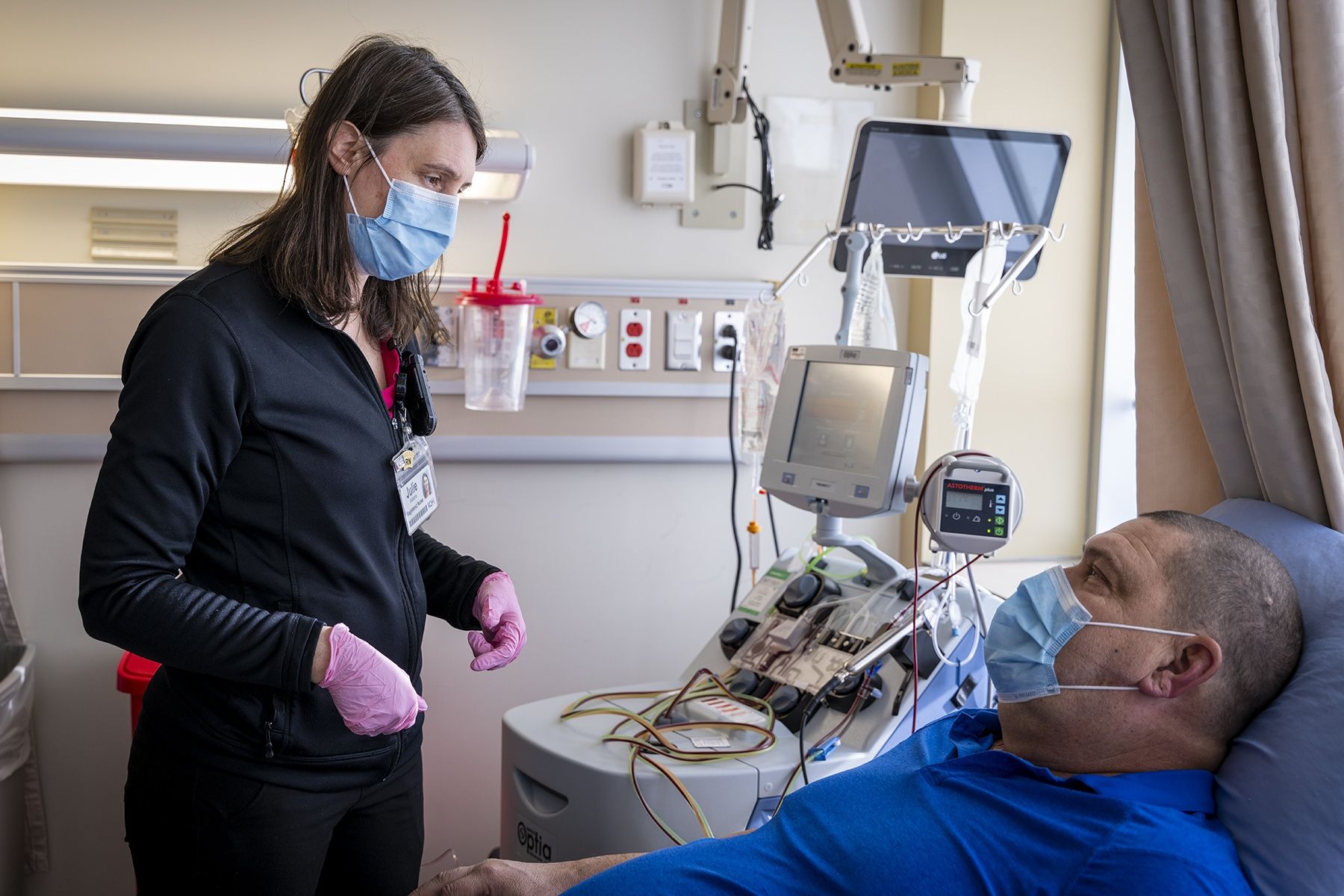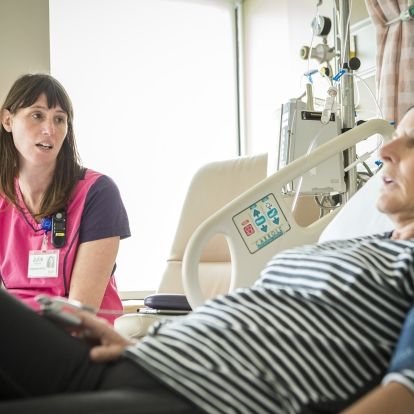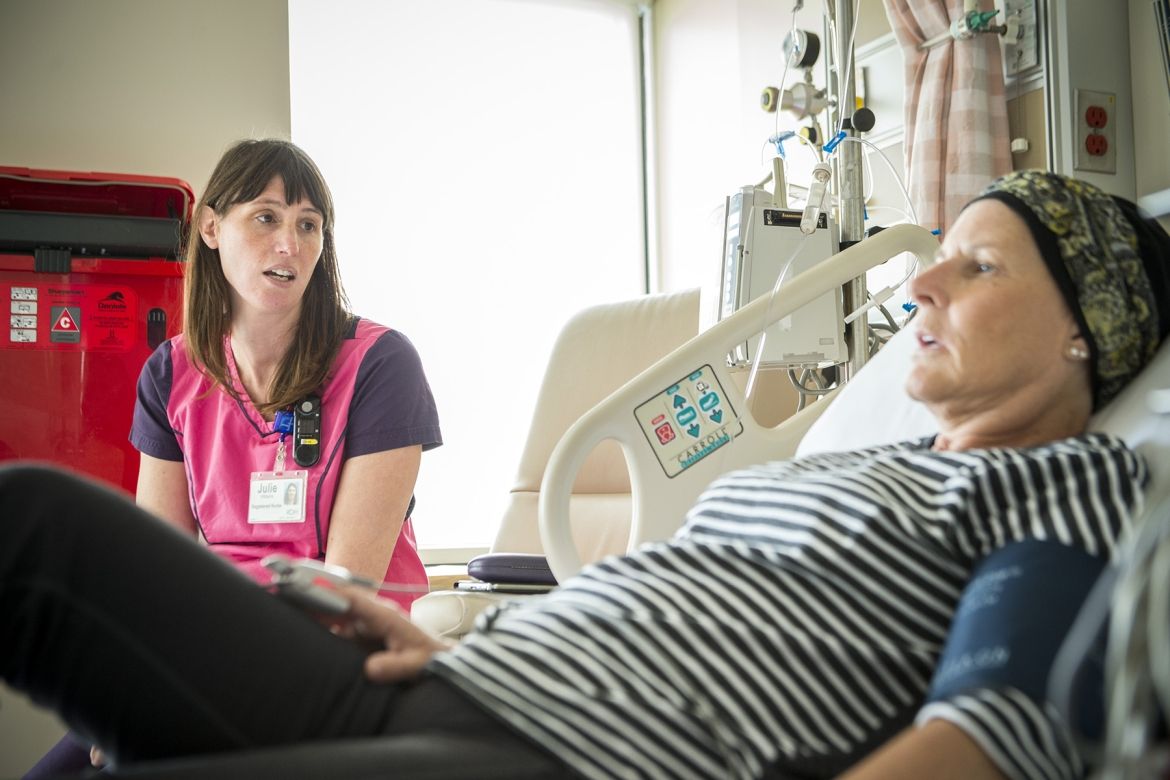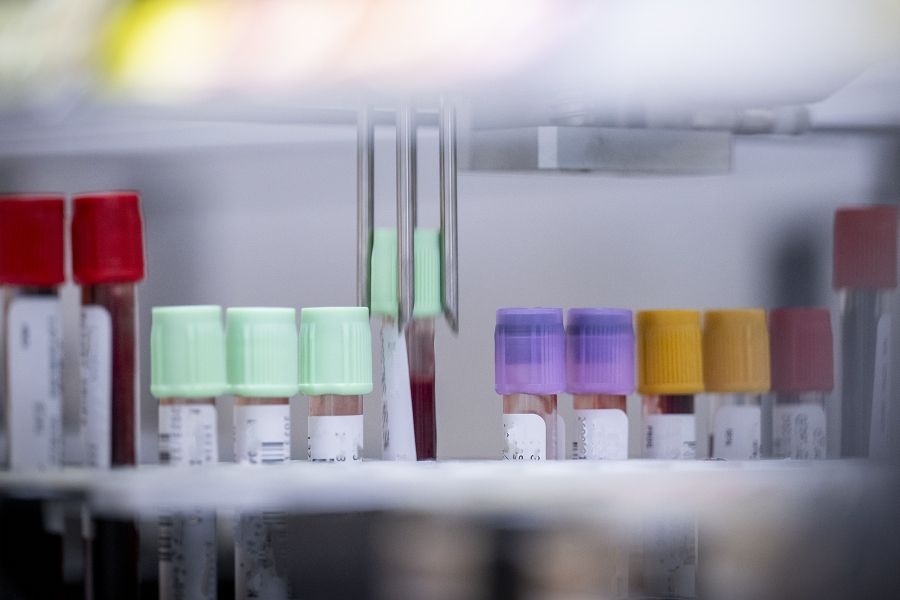
Nestled within KHSC is a team that’s leveraging cutting edge treatments to profoundly impact lives—it’s known as the Autologous Stem Cell Transplant Program. Established in 2004 by Dr. John Matthews, this program operates within the larger Complex Malignant Hematology Program (CMHP), as part of the South East Regional Cancer Centre. The CMHP supports patients across southeastern Ontario, as well as parts of central east Ontario.
Primarily used to treat cancers that effect blood cells, including myeloma and lymphoma, the type of stem cell transplant practiced at KHSC focuses on collecting and then later reintroducing a patient’s own stem cells — known as an “autologous” donation. The cells are collected from a patient through a process known as “apheresis” before the patient is treated with an aggressive round of chemotherapy. Following treatment, the body’s ability to produce healthy blood cells is often compromised, so stem cells are reintroduced as a “rescue” measure to jumpstart the production of healthy blood cells and support recovery.
“The process allows for more aggressive treatment, but the margin for error is thin. In situations like this, you want to know that your healthcare team is following the highest standards of clinical practice. That’s why FACT accreditation is so important - it demonstrates a commitment to excellence in treatment delivery and patient care.” - Rachel Sheldon, quality assurance manager, Autologous Stem Cell Transplant Program.
A commitment to excellence
The Foundation for the Accreditation of Cellular Therapy (FACT) sets the gold standard for clinical and laboratory practices in cellular therapies and, while KHSC has been committed to FACT’s stringent guidelines for over a decade, this was solidified with official accreditation in 2023.
Accreditation elevates KHSC’s position as a quality healthcare organization and highlights that the program exceeds standards in patient care, stem cell collection, and cellular therapy services.
Transplant and cellular therapy organizations need to comply with the most comprehensive standards in the field, and be verified by rigorous peer-reviewed inspections to qualify for accreditation. FACT promotes safety and quality by providing evidence-based practice requirements that are set by an international team of world-renowned experts.
Recently, Cancer Care Ontario (part of Ontario Health), mandated that all stem cell transplant and cellular therapy programs in Ontario be FACT accredited. This makes KHSC one of only 19 accredited programs in Canada, and only one of ten in the province.
KHSC can continue to deliver potentially lifesaving therapies closer to home, as the only accredited centre in the southeast, within the Toronto – Ottawa corridor.
12 years in the making
The Autologous Stem Cell Transplant Team has been working towards accreditation for the past 12 years. In 2019, the program refocused its efforts and began the application process, under the clinical leadership of Dr. Jill Dudebout.
The path to accreditation was no simple feat—over 900 program standards were meticulously assessed. This involved creating quality management plans to show how KHSC would meet and maintain accreditation standards, while keeping meticulous documentation. Audits and risk assessments were also completed.
The final step in the accreditation process was the inspection. Everyone played a role planning the tour to reviewing documentation and coordinating training.
Part exam, part space shuttle launch, staff needed to review hundreds of documents to prepare for a battery of questions, while drilling procedures into everyone to ensure they were completely comfortable with the stem cell collection and transplant process.
“Accreditation took a lot of work from a massive team,” says apheresis lead nurse Julie Williams. “Laboratory staff, nurses, data, quality, and research staff, clerical staff, managers, and clinical leadership all played a big role.”
Williams led practice procedures, including stem cell collections and re-infusions, to help the team get comfortable with explaining and demonstrating procedures to the inspection team. They made the training experience as authentic as possible for inspection day, going as far as making a replica stem cell bag for mock procedures.
Three months of preparation culminated in an inspection in March, 2023. Inspectors, traveling from Missouri, reviewed documents, toured facilities, interviewed staff, and observed procedures. The inspection is intended to assess and verify the compliance application in-person.
Williams cites the team’s pride in their work, and its impact on patients, as a major driving force:
“Hematology is a unique specialty of medicine, where we are making great strides forward in how we treat these diseases. Everyone cares deeply about our program and was invested in ensuring our success for the advancement of the program.”
“It was an intense process, but we are excited to come out the other side fully accredited, says Sheldon. “The compounding difficulties of a global pandemic and competing priorities challenged the team, but everyone rallied, demonstrating an unwavering commitment to delivering exceptional care. It wouldn’t have been possible without the level of collaboration we saw. Every single team member should be extremely proud of themselves. I am proud to serve with this team each and every day.”
Opening the door for new possibilities in Cancer Care
Accreditation marks the beginning of a new chapter for the program, cementing KHSC's role as a regional leader in cancer care. It also allows for future expansion of services that will keep the program on the cutting edge of treatment.
“This has been an intense collaborative project and it is immensely satisfying to see this come together. It is a testament to the exceptional care and team work put forth by our programs and I’ve felt privileged to be a part of this process. This provides a stable foundation of quality management programming from which we can continue to build a solid complex malignant hematology program.” - Dr. Jill Dudebout
Treatments like CAR-T Therapy - where extracted cells are engineered to more effectively target cancer – are now one step closer.
Gallery


Apheresis lead nurse Julie Williams speaks with a patient undergoing stem cell collection. (File photo from pre-pandemic.)



